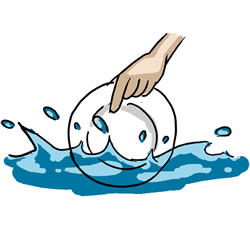TeViLas KeiLim
|
כתב הבית יוסף, נראה לי, דישראל שקנה כלי מגוי לסחורה, אם מכרו לישראל אחר, אין הקונה צריך להטבילו, דכיון שלא נתחייב ביד הראשון, שהרי לא היה עומד אלא לסחורה...
The Beis Yosef understands that eating utensils bought from a Gentile as merchandise for trade, which are then onsold to a Jew as eating utensils, do not require Tevilah. משמע שכלים העומדים למכירה מוגדרים 'כלי סחורה' ואינם 'כלי סעודה' ולכן פטורים מטבילה [ב"י, יו"ד סי' קכ על סעי' ח, בשם רבו מהר"י בירב, והביאו הט"ז שם ס"ק י'] ר' שלמה קלוגר בשו"ת טוב טעם ודעת [מהדורה תליתאה ח'] הרחיב היתר זה גם לכלים שמכינים בהם אוכל בצורה מסחרית. Rabbi Kluger understands this includes eating utensils used in a food business; they do not require Tevilah. נראה דלא חייבה התורה טבילה רק להקונה כלי סעודה להשתמש בו לאכילה אבל אם קונה כלי לעשות בו מאכל למוכרו לאחרים ... אינם כלי אוכל אלא כלי סחורה. The obligation to Tovel eating utensils in a Mikveh applies only to utensils owned by a Gentile which are used as eating utensils that pass to Jewish ownership to be used as eating utensils. על פי היתר זה, יישב הדרכי תשובה [יו"ד סי' קכ ס"ק יג וס"ק ע, על פי שו"ת שבט סופר, ח"ב סי' סז] את מנהג ישראל לשתות משקאות אצל מוזג יהודי שלא טבל את כליו, מפני שהכלים נמצאים בידו לסחורה בלבד ופטורים מטבילה. The Darchei Teshuvah thus explains the common practice of Jews eating and drinking in the restaurants operated by Jews who do not Tovel the dishes. They do not require Tevilah because they are not eating utensils but business tools. |
We are commanded by HKBH to immerse metal and glass eating utensils acquired from a non-Jew, in a Mikvah.
Known as TeViLas KeiLim, it is notionally identified with our ambition to elevate the base aspects of life, in this case the need to eat and the pleasure associated with eating; in order to focus on the loftier more spiritual purposes of life. The laws are introduced in the Torah, following the battle with the Midianites [Bamidbar 31:23, Rashi; Avoda Zara 75b] who attempted to demoralise the Jews; to degrade and defile us from our lofty connection with HKBH. This was attempted by luring and seducing the Jews with the most base and crude human weakness. To this end they debased their own womenfolk. The parallels to the conversion procedure, where a convert to Judaism immerses in a Mikveh are quite obvious. Utensils owned by a non-Jew, do not require Tevilah, even if permanently used by a Jew.
Vessels requiring Tevilah
Tevilah requires a BeRacha. One BeRacha will suffice for a session of Toivelling no matter how long that session continues. Short rest breaks etc. do not require a repeat of the BeRacha. Omitting the BeRacha does not invalidate the Tevilah. Bottles and Cans HaRav Moshe Feinstien (Igros Moshe YD 2:40) permits drinking from a glass or metal bottle or can, even though it is being used as a cup, and has not yet been immersed in a Mikveh, since its main function until opened, is for transport and handling, it is not an eating utensil. Only when opened does it transition to being a eating utensil. It is therefore deemed to be an eating utensil manufactured by the Jew who opened it and does not require Tevilah. The same argument permits utensils salvaged from trash to be used without Tevilah. HaRav Hershel Schachter (Ten Minute Halacha - Practical Tevilas Keilim Issues by Rabbi Aryeh Lebowitz, min. 8) disagrees. R' Yechiel Yaakov Weinberg (Sridei Esh YD 2:29) suggests to have in mind when making the purchase, not to acquire the bottle, just its contents. That way, since a Jew does not own the vessel Tevilah is not required. Rav Menashe Klein (Mishne Halachot 4:107) argues that since we are loyal to HKBH, this condition is automatically applied and there is no need to consciously think about this at the time of purchase. Electric Appliances A few authorities consider devices that plug into a power outlet to be attached to the ground and therefore exempt from Tevilah. Most however, rule that they do require Tevilah with some suggesting that only the components which make direct contact with food need be immersed. It is possible to avoid any need to make Tevilah by legally transferring ownership to a non-Jew. This can be accomplished by presenting it as a gift, conditional to it being lent to you for eternal use. Tevilah of a Convert’s Vessels Rav Ovadia Yosef (Yabia Omer YD 7:8) considers the possibility that a convert's vessels do not require Tevilah because the owner's transformation is dissimilar to the situation described in the Torah where the utensils changed domains. Rav Wosner [Shevet HaLevi 4:92:2] disagrees. The Sochachover Rebbe (cited by Yabia Omer) proposed that the conversion itself also attends to the status of the eating utensils. Utensils that were not immersed A utensil may not be used, even once, before it is immersed in a Mikvah. Such utensils do not render foods non-kosher. When utensils requiring Tevilah have become confused with those that have already been Toiveled, if it is due to our not having kept track of where we kept the various groups, then it is a case of KaVuA and all the utensils must be Toiveled. However, if the groups were somehow combined into an incoherent mix, then we apply the rule of Kol DePoRish, and we follow the majority. |




